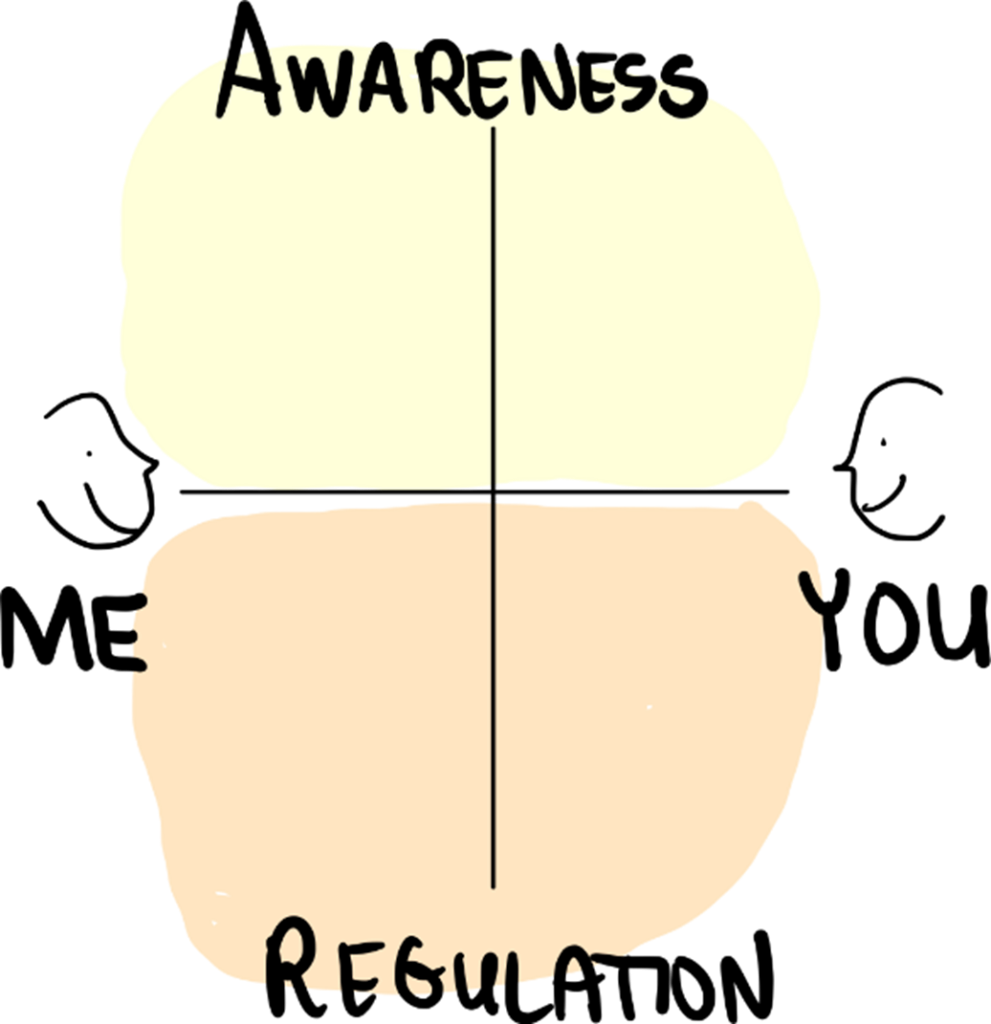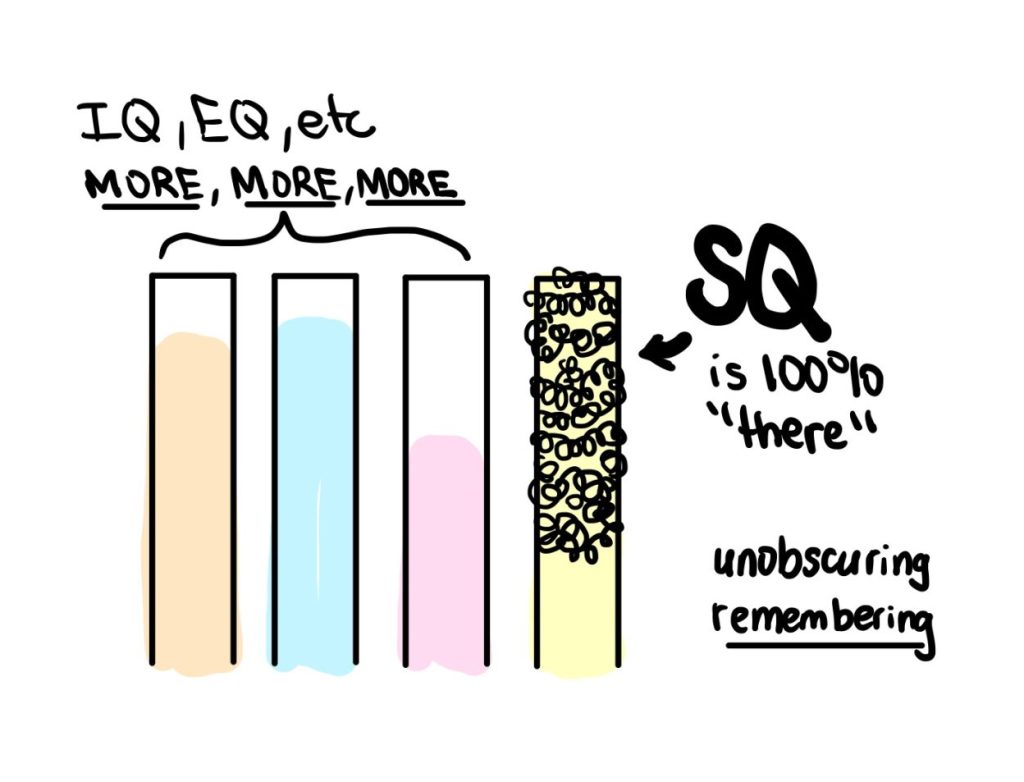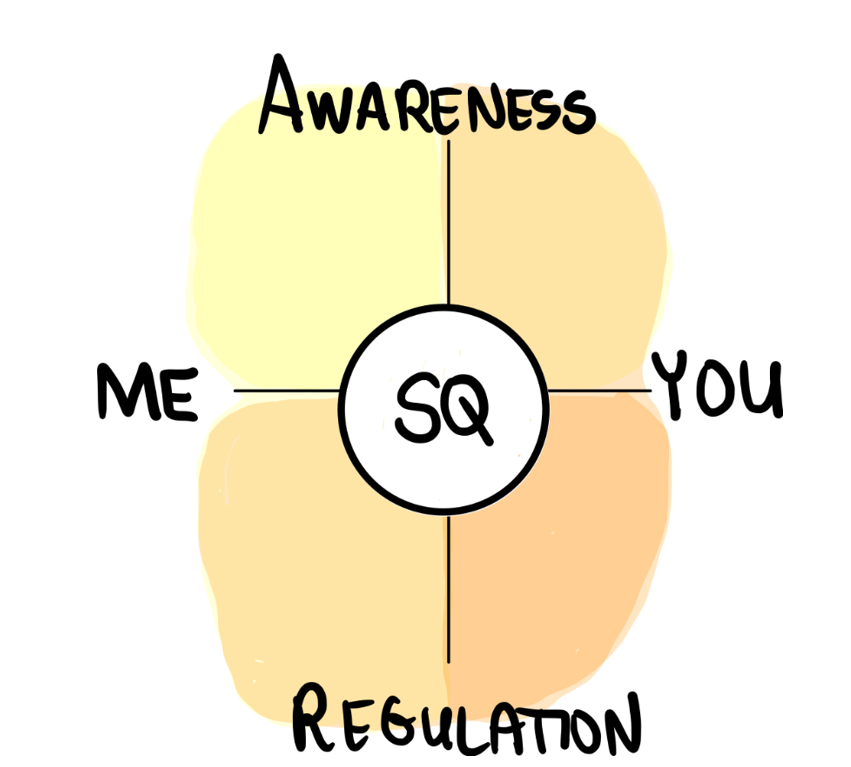Emotional Intelligence (EI) is often depicted in four key quadrants: self-awareness, self-management, social awareness, and relationship management. Back in 2017 Google looked at over 100 teams and they found out that their highest performing teams had 2 things in common: High emotional intelligence, and open communication. More recently the McKinsey Global Institute identified 56 DELTAs (Distinct Elements of Talent and Attitude) that can equip individuals to thrive in tomorrow’s workplace. McKinsey’s research involved 18,000 people in 15 countries and they “…identified 56 distinct elements of talent (DELTAs) that fall within these skills groups. We call them DELTAs, rather than skills, because they are a mix of skills and attitudes. ‘Adaptability’”’ and ‘coping with uncertainty’ are attitudes, for example.”
I noticed that many DELTAs map directly to EI competencies. This post considers the four classic EI quadrants and demonstrates where the DELTAs fit in (in my view). Here’s the empty quadrant view:

self-Awareness
Note the lowercase s, which is used in EI/EQ. We reserve the uppercase S for Self / Self Energy (per multiplicity of mind, e.g. IFS, Internal Family Systems, DiSC DiSCO™, Mind CREW™).
self-awareness, is all about understanding your own emotions, drivers, and reactions:

self-reflection encompasses:
- Awareness of strengths/weaknesses; risk taking, self-motivation, wellness, decisiveness, persistence, innovation, perspective-taking, competence, self-confidence, ethics, digital ethics, coping with uncertainty, passion, energy, optimism, integrity, humility, etc. (see above sketch)
- Understanding one’s emotions and triggers
- Recognizing how trauma may drive reactions and triggers
- Approaching oneself with patience, compassion, and curiousity
- Identifying different parts (managers, firefighters, exiles per IFS) that drive emotions and reactions; Understanding each part’s role and approach with curiosity
- Recognizing how different polyvagal states (ventral vagal, sympathetic, dorsal vagal) affect your own emotions, thoughts, and behaviors; Learn to shift from unduly stressed to calm states
self Management
EI as a practice typically uses “self Management” where we are using self Regulation below. Why the distinction? Whereas self management is all about “managing” your emotional reactions and behaviors, self regulation is about regulating your nervous system and the physiology of your whole body.
We even take this a step further to address self SHIFTING — making shifts in your nervous system, etc. so that you do not have to play a whack-a-mole game of self management.

- Impulse control
- Stress management
- self-discipline
- Adaptability
- self-control and regulation
- Coping with uncertainty
- Flexibility
- Achievement orientation
- Understanding strong reactions may be a trauma response
- Focusing on safety, stabilization, and empowerment (establishing polyvagal GREEN as a home base)
- Welcoming and conversing with helpful/”helpful” protective parts (all parts have helpful intent… the outcome isn’t always truly helpful, hence “helpful”)
- Unburdening parts (parts often take on extreme roles to help/”help” the system)
- More and more unobscuring of Self; having more Self Energy (Self leading parts)
- Building capacity to regulate emotions and behaviors by managing polyvagal state shifts. Moving from fight, flight, or freeze responses to grounded, centered presence
- Remaining true to values and ethics (even if unpopular)
- Managing (really shifting) bias ; see also the Similar to Me Effect
- self coaching / Self led: Applying and fostering a growth mindset, learned optimism (Is a part coaching you, or are you being led by Self/Self Energy?)
- Growth Mindset
- Curiosity
Social Awareness
Understanding others’ perspectives and emotions:

- Empathy
- Organizational awareness
- Diversity appreciation
- Active Listening
- Recognizing others’ behaviors through a trauma lens, while assessing personality/behavioral style, e.g. DiSC DiSCO™, MindCREW™
- Suspending judgement and listen openly; We move from judgment –> nonjudgment –> welcoming
- Perceiving others’ parts and dynamics with compassion
- Addressing protective parts kindly
- Perceiving cues in others that signal their internal polyvagal state, whether stressed/threatened or open/engaged; Having compassion
- Focusing on value, e.g. the many stakeholder perspectives on value; See also outcome-orientation.
- Seeking relevant info
- Asking the right questions
Relationship Management
This quadrant is about handling interpersonal interactions effectively:

- Influence
- Conflict management
- Collaboration
- Communication
- Coaching
- Foster safety, trust, and empowerment
- Avoid power struggles, respect pace
- Support growth collaboratively
- Perceive relationships systemically
- Unburden relational trauma collectively
- Connect at level of true Self
- Cultivate interactions that create safety, trust, and social engagement vs. defensiveness. Foster polyvagal states of connection in yourself and others.
- Win-win negotiations (See also: Free Microcourse)
- Leadership
- Managing up, motivating different personality parts, socialability, networking, role modeling, etc. (see image, above)
The Shortcut to EQ is SQ
Let me ask you… How much shorter does this list get when we have high SQ? SQ shining through, we have:
- Connection
- Compassion
- Curiosity
- Understanding
- Generosity
- Kindness
We have access to presence and connectedness that does not require tactics and tools to build X, Y, Z. We have integrity without having to learn what it means to have integrity and without the need to learn tools to demonstrate integrity. What is SQ? It’s about reconnecting with what you are beneath all the daily doing.
If you think of the term “human being” as having a human aspect and a being aspect, SQ is all about letting the 100% perfect being aspect shine through all the humaning.

We have a biological spacesuit to help us with the humaning. The being aspect can be pictured as a beautiful light. Interesting, light is pretty special and cool because it can be both a particle and a wave. Thus, perhaps the what-ness of what we are is form-less… energetic… a Quantum Self, Omniversal Self, or simply Self / Self Energy.
The shortcut to embodied EQ is SQ:

Of course, there will be things that are still worth learning. But a lot of the deltas I wrote in on those prior graphics get minimized down to: suitstuff, suitstuff, suitstuff. Imagine this: our true essence is Self / Self Energy. Self is projected through a biological spacesuit. This biological spacesuit is only ever helpful/”helpful.” Rather than show up with a biological spacesuit in YELLOW and try to force rules into the brain that we can follow, we can make shifts and show up in GREEN, more connected, and with our ‘smarty pants brain’ getting more oxygenated blood flow to boot! With more Self Energy in our systems we are naturally — effortlessly — showing up with more: compassion, curiosity, clarity, creativity, calm, confidence, courage, and connectedness.) Research on the science of Oneness has shown that individuals who’ve had such experiences often display increased prosocial behaviors—think compassion, empathy, and altruism. When you’re operating from a space of Oneness, you’re naturally in sync with yourself and others. Prosocial behaviors are EQ competencies in disguise, and they come as second nature (really the 1 true nature) when you’re tuned into SQ.
When my Quantum Self is shining through. I can show up as love. I can show up kind. I can show up intuitive. I have all the C’s that IFS lists and I can’t even get rid of them if I tried. It’s effortless.
Versus a more suitstuff focus of: “Hey, we have to learn the 5 keys to trust and then the 8 dimensions of integrity, and then the 6 step formula to optimism, and then the collaboration toolkit, and the course on confidence…”
When we show up in GREEN (polyvagal) there is relational trust between us. We are also more connected to our Quantum Self (or simply Self as IFS would say). Is that a coincidence? I don’t believe so. 😉